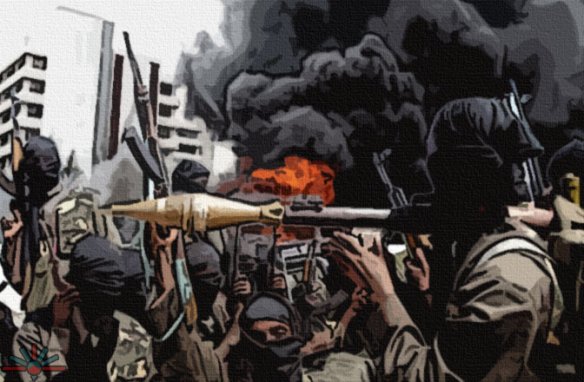In recent months, Boko Haram has devastated a number of communities across a vast swath of Northern Nigeria, and even reaching into Chad, Cameroon and Niger. Although Boko Haram has some territorial control in the border regions near Lake Chad, its attacks do not occur in a consistent geographic area, but rather devastate communities with considerable distance between them. This mobile pattern contrasts with other, more geographically-fixed rebel groups, such as the Niger Delta People’s Volunteer Force (NDPVF) fighting for the self-determination of the Ijaw people and control of the rich resources in the Niger Delta in Southern Nigeria.

A stylized portrait of Boko Haram. By AK Rockefeller.
We examine in two recent articles forthcoming in International Studies Quarterly (with Nigel Lo) and International Studies Review how the participants in armed conflict shape geo-spatial patterns and the implications for conflict management and peacekeeping. In considering these questions, it is helpful to draw an analogy between Boko Haram and Mancur Olson’s roving bandits. As a thought experiment, Olson considers roving and stationary bandits operating under anarchy. Roving bandits rely on brute force to move from place to place, extract rents, and move onto another location after they drain the available resources in one place. Stationary bandits, in contrast, extract resources by taxing local production and hence develop an encompassing interest in the welfare of the local economy. The stationary bandit will be wary of extracting all the currently available resources, as this will leave them with fewer resources to extract in the future. As such, stationary bandits extract resources not just through naked coercion, but also through some form of implicit social contract. They provide public goods—such as security—and, in return, receive rents from the local population. This provides an incentive for the stationary bandit to invest in the conquered area rather than completely exploit it. In this sense, stationary bandits set up hierarchical relationships that resemble a proto-state. Armed actors able to establish consistent hierarchy can come to rule with consent, or legitimate authority, rather than through more costly brute force against continued resistance. In the intrastate conflict context, rebel groups that stay localized—and, by implication, fight in more consistent locations—can better compete with the state as the side with legitimate authority and win local support.
If stationary bandits have an advantage of being able to establish authority and some degree of consent from the local community, then what does this suggest about Boko Haram as a mobile group? What has prevented Boko Haram from establishing stronger hierarchies within Northern Nigerian and surrounding communities, and driven the group to ravage communities and depend on power through coercion and fear?
- Read more at the blog Political Violence @ a Glance, where the full text was published 16 April 2015.